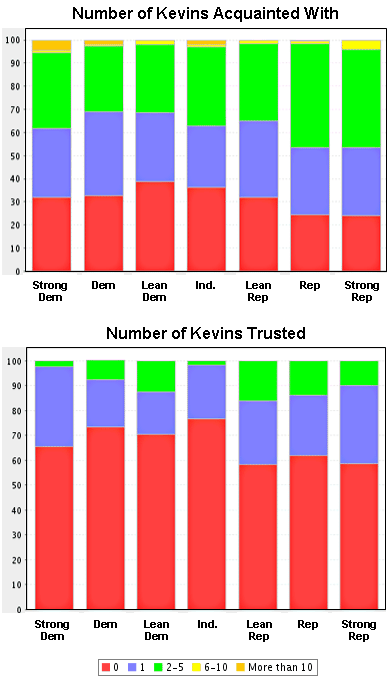AND NOW FOR SOMETHING COMPLETELY DIFFERENT….Yesterday I posted a chart that plotted the frequency of prayer vs. partisan affiliation. It came from Razib Khan, who created it using data from the University of Chicago’s General Social Survey. Today, although he was happy that a few blogs linked to it, he lamented that “alas, the practice of looking to the GSS to test some intuition or CW hasn’t spread like wildfire.”
Well. That’s like catnip around here. I myself have never done this for a simple reason: I didn’t know I could. But it turns out that some fine folks at Berkeley have built a simple web interface for the GSS and several other big databases (here), and anyone who feels like poking around can do so. So I did.

The interface lists all the questions that the GSS asks and allows you to plot variables against each other to see what pops out. I did that for a while, generating nothing of any value, until I finally discovered something of vital importance: one of the questions on the 2006 GSS was, “How many people named Kevin are you acquainted with?” And there was even a followup question: “How many of those people named Kevin do you trust?”
I had to find out. Now, I could have plotted this against anything I wanted — age, sex, religious attendance, zodiac sign (really) — but this is a political blog, so I plotted it against party affiliation. The results are on the right, and they’re a little disturbing. Eyeballing the numbers, people appear to know an average of two Kevins each, but they only trust about half a Kevin each. So on average, people only trust about 25% of all the Kevins they know.
That’s a little deflating, isn’t it? But interesting! If you’re named Kevin, that is. You can check out results for your own name, but only if your name is Kevin, Karen, Shawn, Brenda, Keith, Rachel, Mark, Linda, Jose, or Maria. Your guess is as good as mine about why they chose those ten.
You can also do other stuff, of course, and that includes mining the data and abusing the results to produce results you find pleasing. And then blogging about it. You can probably expect some of that in the future. Until then, have fun.















